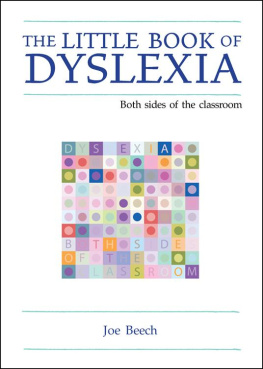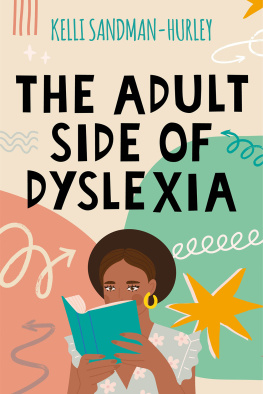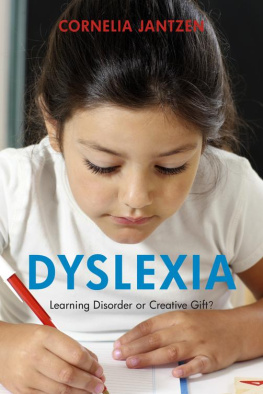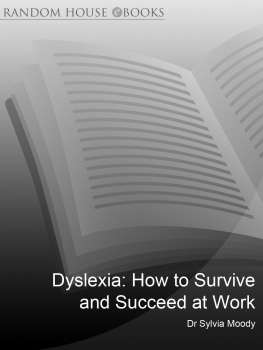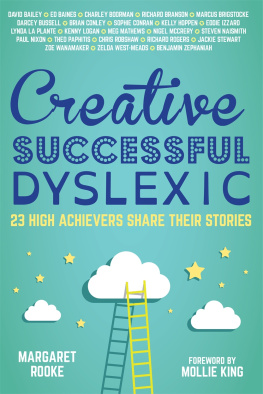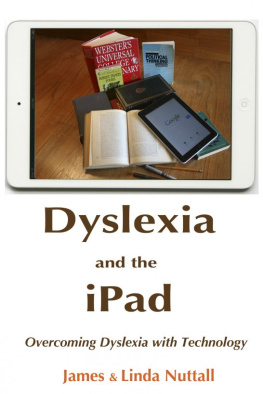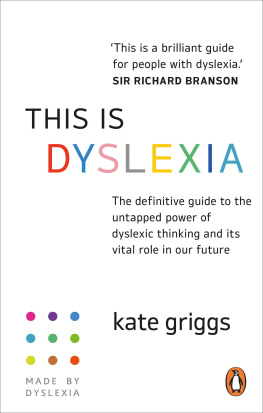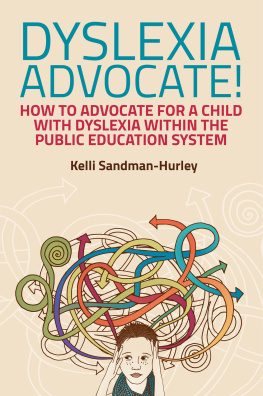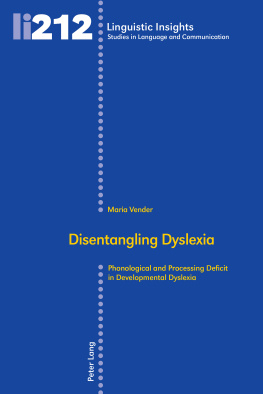Title Page
DYSLEXIA AND US
A Collection Of Personal Stories
Dyslexia Scotland
Publisher Information
First published 2011 by Edinburgh City Libraries
Digital edition published in 2013 by
Andrews UK Limited
www.andrewsuk.com
This book is sold subject to the condition that it shall not, by way of trade or otherwise, be lent, resold, hired out or otherwise circulated without the publishers prior written consent in any form of binding or cover other than that in which it is published, and without a similar condition being imposed on the subsequent purchaser.
Copyright 2011, 2013 Dyslexia Scotland
The right of Dyslexia Scotland to be identified as the editor of this work has been asserted by them in accordance with the Copyright, Designs and Patents Act 1988.
Acknowledgements
Dyslexia Scotland would like to extend our sincere thanks to all the contributors of the stories in this book. Some of the contributors are members of Dyslexia Scotland, some heard about the project through our network and others through a variety of sources. We thank you all for your invaluable contributions.
We would also like to extend a special thanks to Tamsin Morrison, an artist with dyslexia who designed the front cover of this book and to our President, Sir Jackie Stewart, for his foreword and for contacting a number of celebrities to ask them to write their stories.
Our deep gratitude goes to Edinburgh City Libraries for funding this book, and in particular to David Walker for publishing it and to Councillor Deirdre Brock, Liz McGettigan and Grainne Crawford for their valued support.
About Dyslexia Scotland
Dyslexia Scotland is a national charity that represents the needs and interests of dyslexic people in Scotland.
Our aim is to encourage and enable children, young people and adults with dyslexia, regardless of their age and abilities, to reach their potential in education, employment and life.
We offer high quality services at both a national and local level through our network of volunteer-led branches. We also aim to raise awareness and influence change at a national level.
For more information:
www.dyslexiascotland.org.uk
Dyslexia Scotland
2nd Floor - East Suite
Wallace House
17-21 Maxwell Place
Stirling FK8 1JU
Dyslexia Scotland is a charitable company limited by guarantee. Registered in Scotland No: SC153321
Scottish Charity No: SCO 00951
If you have been moved by these stories, please consider making a donation to Dyslexia Scotland or joining as a member so that we can continue to support dyslexic people of all ages and abilities across Scotland.
Foreword
by Sir Jackie Stewart OBE
President of Dyslexia Scotland
Today, dyslexia is talked about more openly than it ever has been.
When you are dyslexic, you simply cannot do things like the clever folk. Some say its a sort of wiring error between the left and the right side of the brain. Others say that it is hereditary, or it is caused by a long labour in birth, or perhaps a jaundice birth. It can sometimes jump generations, but quite often, it shows up within the family tree. Dyslexia can destroy people, it can break up families and it can drive people to drink and drugs whilst they are trying to escape the reality of their inabilities.
For many years and sadly even today, many teachers simply havent gone to the trouble of finding out enough about dyslexia to help students to get around the problem, if not to get over it completely. My school years were certainly the most unhappy years of my life. Back then, few teachers had any knowledge at all about something called Dyslexia.
What has been achieved by Dyslexia Scotland surpasses anything done elsewhere. The education authorities and the seven teacher-training colleges in Scotland have now, with the help of the present and previous Scottish Governments, turned around the attitude of many of the professional educational leaders in our land. From last year onwards, every single new teacher being trained in any of our seven teacher-training colleges in Scotland will, upon leaving college, be in possession of a degree which includes the skills for the early recognition of a child with a learning problem. No other country in the world has this; what a wonderful example Scotland is, to the other educational leaders around the world.
The question is whether the other educational leaders will pay attention and whether old dogs want to learn new tricks? Sadly, sometimes not. The damage that they do however, by not knowing how to deal with a young person with learning difficulties, is far beyond their comprehension. The parents become mightily distressed; they are told many times in the school reports that their child is not paying attention, is not concentrating, is lazy, not doing their homework, or is even seriously disruptive within their class or school. Many leave school with very few skills for reading, writing or numeracy. I was one of those children, but I had ambitions and I desperately wanted to be good at something. I wanted to make a living and was ambitious about one day affording some of the wonderful things that I could see other people enjoying.
Many young people who leave school are told they are unemployable. Partially because, nowadays, theres a thing called a job application form, which the large majority of dyslexics would never be able to fill in. When they are continuously turned down, because of their lack of skills in reading and writing, quite often they turn to crime as it pays better than unemployment in most cases but, of course, they more often than not end up in prison, at a huge cost to the nation, which disrupts their marriages, their parents and their brothers and sisters. They lose their own confidence and self-esteem and many of them turn to violence in frustration; particularly if they are of tall and heavy build; they simply cannot take it any more and they lash out.
I, myself, have been working with Kenny MacAskill, the Minister of Justice and Mike Russell, the Minister of Education, trying to put pilot schemes together, in Saughton Prison in Edinburgh; the home of over 900 detainees. Many of them dont want to admit that they cant read or write, because to their mind, it shows a weakness that could be taken advantage of by other inmates. We have been trying to increase the education for prisoners within the penal system, so that while they are in prison, they could in fact become capable of reading or writing by the time their sentence is served. If that were to happen, we hope they could rejoin society to be productive, support their families, rebuild their lives, become decent parents to a growing family and no longer take up many man-hours from the police force and be disruptive. However, if we dont help them in prison, the chances are that they will become serial detainees.
A lot still has to be done and much has to be learned. Its far from being unilaterally dealt with in the appropriate fashion by government, the local authorities, the educational establishments, the police force and even the armed services. However, if the will is there, we can all perhaps find a new way of doing business by thinking out of the box and by keeping pressure on our government and our educational authorities around our country not to abandon the potential of the people who have been discarded in many cases educationally.
Leonardo da Vinci was dyslexic, as was Albert Einstein, along with some of the wonderful film creators; Steven Spielberg and George Lucas. Some magnificent sports people; Mohammed Ali or Sir Steve Redgrave. The Bankers, such as Charles Schwab of the United States of America, who made a huge fortune by going about his business in a different way, because his dyslexic mind found a new way to direct people to make money by banking with him.
Next page

